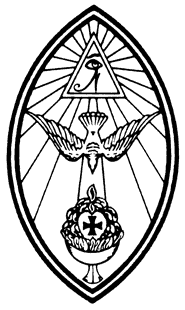
Back Орден на източните темплиери Bulgarian Ordo Templi Orientis Czech Ordo Templi Orientis Danish Ordo Templi Orientis German Ordo Templi Orientis Esperanto Ordo Templi Orientis Spanish Ordo Templi Orientis Estonian سازمان معبد شرق Persian Ordo Templi Orientis Finnish Ordo Templi Orientis French

| Part of a series on |
| Thelema |
|---|
 |
Ordo Templi Orientis (O.T.O.; lit. 'Order of the Temple of the East' or 'Order of Oriental Templars') is an occult secret society and hermetic magical organization founded at the beginning of the 20th century. The origins of O.T.O. can be traced back to the German-speaking occultists Carl Kellner, Theodor Reuss, Heinrich Klein, and Franz Hartmann. In its first incarnation, O.T.O. was intended to be modelled after and associated with European Freemasonry[1] and as such in its early years only Freemasons could seek admittance.
Founder and first head of the Order Carl Kellner wanted to create an Academia Masonica wherein various rites of high-degree Freemasonry could be conferred within German-speaking countries.[2] During the course of his esoteric studies across the globe and from many traditions, Kellner believed that he had discovered a key which offered a clear explanation of all the complex symbolism of Freemasonry and of nature itself. Kellner intended that O.T.O. preserve and confer this key.
After the death of Reuss, English writer and occultist Aleister Crowley assumed control of the Order. Crowley had been inducted into O.T.O. by Reuss in the early 1910s. While maintaining many core elements of Freemasonry and the intentions of both Kellner and Reuss, O.T.O. was drastically changed by Crowley. The guiding philosophy of O.T.O. from this point on became Crowley's self-created occult system, Thelema. With this change O.T.O. ceased its bestowal of Masonic degrees and membership requirements.[3]
After Crowley's death in 1947, four main branches of O.T.O. claimed exclusive descent from the original organization and primacy over the other ones. Courts have ruled that the organization incorporated by Crowley's student Grady McMurtry in 1979 is the legal continuation of the Order[4] and is the exclusive owner of the names, trademarks, copyrights and other assets of Crowley's O.T.O.[5][6]
- ^ Bogdan & Starr (2012), pp. 10, 148–150.
- ^ Kaczynski (2010), p. 350.
- ^ Bogdan & Starr (2012), p. 239.
- ^ Hanegraaff, Wouter J.; Faivre, Antoine; Broek, Roelof van den; Brach, Jean-Pierre (2005). Dictionary of Gnosis and Western Esotericism (Online ed.). Leiden: Brill. ISBN 9789004141872. Retrieved 11 August 2018.
- ^ Cite error: The named reference
Mainewas invoked but never defined (see the help page). - ^ Cite error: The named reference
Carboniwas invoked but never defined (see the help page).
© MMXXIII Rich X Search. We shall prevail. All rights reserved. Rich X Search